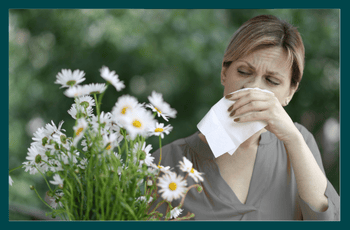Hay Fever Treatment
Speak to a registered online doctor within 15 minutes via telehealth about hay fever. 24/7 online consultations available, Australia-wide.
About hay fever
Hay fever, also known as allergic rhinitis, is an allergic response triggered when your immune system overreacts to harmless substances in the environment. Common allergens include pollen, dust mites, pet dander, mould spores, and other airborne particles. When a person with hay fever encounters these allergens, their immune system identifies them as a threat and releases chemicals like histamine, leading to inflammation and irritation in the nasal passages and inner lining of the nose.
This allergic reaction causes a range of bothersome symptoms such as sneezing, runny or blocked nose, itchy eyes, throat irritation, and fatigue. The specific triggers for hay fever can vary greatly from person to person. Though hay fever isn’t life-threatening, its symptoms can disrupt daily activities, sleep, and overall quality of life if left unmanaged.
Medically reviewed by Dr. Ammar AL-ANI, MBChB, CCBST, AMC
When to consult a doctor for hay fever?
Patients suffering from minor symptoms of hay fever usually will be able to tackle it with some at-home remedies, and over-the-counter medications. and being consciously away from known allergens. You should see a doctor and seek medical advice as well as prescription medications if:
- No relief: Over-the-counter medications aren’t providing relief.
- Persistent symptoms: Your symptoms, like sneezing, itchy eyes, or congestion, are worsening or persisting for a long time.
- Disrupting daily activities: You have trouble sleeping, breathing, working or concentrating due to symptoms.
- Frequency: If you have frequent sinus infections or ear problems linked to hay fever.
- Symptoms not clear: You’re unsure if your symptoms are due to allergies or something else.
What are common triggers of hay fever?
Symptoms of fever usually include:
- Pollen (grass, weed or tree)
- Dust or dust mites
- Moulds and spores
- Pet dander and pet hair
- Air pollutants and sprays
What are common symptoms of hay fever?
Inflammation and swelling of the inner lining of the nose or the airways causes the symptoms of hay fever. This inflammation and swelling happen when your nose meets potential allergens. The severity of these symptoms might differ from person to person and not everyone will experience all the symptoms. Here are some of the common symptoms of hay fever:
- Excessive sneezing
- Itchy, blocked or runny nose
- Itchy and watery eyes
- Breathing from mouth
- Snoring in sleep
- Less frequent symptoms include headaches, sore throats, ear infections in children and more.
How is hay fever different from a cold?
How to get rid of hay fever?
You can get rid of hay fever by avoiding allergens, use medications like antihistamines and nasal sprays, and consider immunotherapy for long-term relief. Lifestyle adjustments, such as keeping windows closed and using air purifiers, can also help.
What is the best home remedy for pollen allergy?
Hay fever is also caused by an allergy to grass, weeds or tree pollen. It is important to see the pollen forecast, and pollen counts before venturing out to ensure you avoid high pollen presence in the air. To manage pollen allergies, try these home remedies for pollen allergy:
- Monitor pollen counts and stay indoors during high-pollen times.
- Keep windows closed and use air conditioning with HEPA filters.
- Shower and change clothes after being outdoors to remove pollen.
- Use saline nasal rinses to clear allergens from nasal passages.
- Stay hydrated and eat a diet rich in fruits and vegetables to support your immune system.
- Consider natural remedies like local honey or herbal teas
Can an online doctor help with hay fever if the GP near me is unavailable?
Yes, a licensed medical practitioner online can help you diagnose and find the right treatment or medicine for your hay fever symptoms if the GP near you is not available. Telehealth doctors are available 24/7 and can be accessed from the comfort of your home. Whether you are in the suburbs, rural area or remote region, it is easy to speak to a licensed doctor with Hola Health.
Can you get an online script for hay fever?
Yes, you can get a prescription online from a registered medical practitioner for hay fever. During the telehealth appointment for online prescription, a telehealth doctor will speak to you about your symptoms, diagnose your condition, and give medical advice as well as an instant script for any of the medicines.
How can we help?
Manage your hay fever symptoms quickly and comfortably without sitting in a waiting room.
- 24/7 Online doctor access: Speak to an AHPRA-registered GP anytime via telehealth.
- Legitimate online scripts: Get prescriptions for hay fever medications sent directly to your phone. You can get chemist delivery through Hola Health.
- Medical certificates: If hay fever symptoms are affecting your ability to work or study, Hola Health can provide a medical certificate online.
- Online doctor referrals: If necessary, your online GP can refer you to an ENT specialist, diagnostic referrals for further testing or care.
Talk to a doctor today
Instantly connect to a registered practitioner within 15 minutes from anywhere in Australia, 24/7 for:
- General consults
- New & repeat scripts
- Referrals
- Medical certificates
- Mental health plans

Access telehealth services
Doctors Brisbane | Doctors Melbourne | Doctors Perth | Doctors Sydney | Doctors near me | Doctors Canberra | Doctors Adelaide | Doctors Darwin | Doctors Hobart
After hours Doctor Brisbane | After hours Doctor Melbourne | After hours Doctor Perth | After hours Doctor Sydney | After hours Doctor Hobart | After hours Doctor Gold Coast | After hours Doctor Canberra | After hours Doctor Adelaide | After hours Doctor Darwin | After hours GP | After hours doctor
Medical certificate | Medical certificate online for work | Medical certificate for school | Medical certificate for Uni | Medical certificate for stress | Carer’s leave certificate | Medical certificate NSW | Medical certificate QLD | Medical certificate VIC | Medical certificate WA | Doctors certificate online | Multi-day Certificate | Sick certificate online | GP medical certificate | Doctors note | Telehealth medical certificate | 2-day medical certificate | Medical certificate for sick leave
Instant scripts | eScript | Online prescriptions | Online prescriptions Sydney | Online prescriptions Melbourne | Online prescriptions Perth | Online prescriptions Brisbane | Online Rx prescription
Online referrals | Blood test referral | X-Ray referral | Pathology referral | Radiology referral | Specialist referral | Gynaecologist referral | Audiology referral | Ophthalmologist referral | Paediatrician referral | Ent specialist referral | Endocrinologist referral | Dermatologist referral | Urologist referral | Gastroenterologist referral
Telehealth appointment | Online Doctor | Bulk Billing Doctors | Doctors on-demand | Instant consult | Covid antiviral | Dial a Doctor | Online GP | Doctor appointment | Bulk-billing doctors | Telehealth pricing | GP online chat | Australian doctor | Web doctor | Home doctor | 24-hour doctor















